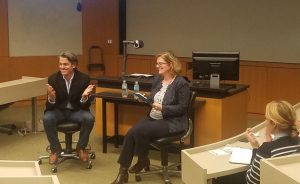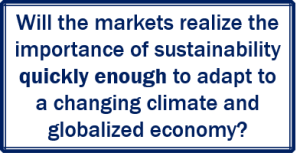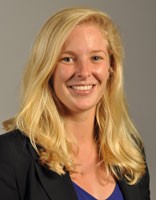This post is written in December 2017 by Kat McNeil, a second year Duke MBA candidate and CASE i3 Fellow.
Matthew Weatherley-White conveys infectious optimism about the potential to leverage capital markets to drive positive impact. With a self-proclaimed aversion to conventionality, Matthew’s winding path took him from ski bum, to Smith Barney broker, to poet, all the way to co-founder and managing director of the Caprock Group and client advisor for Caprock’s impact investing platform. Caprock is a multifamily asset management firm founded in 2005 with $250 million that has grown to $4 billion in assets under management with offices in Boise, Seattle, Park City, and San Jose. As one of only 40 founding B Corporations, Caprock is committed to, and was certified from its inception in, the sustainability and multi-stakeholder metrics specified by B Lab.
Matthew visited campus recently as part of the CASE Executive Speaker Series, and spoke to a diverse audience of Duke MBAs and Durham-area community members. Ready to soak up any and all insights from an impact investor in the field, participants asked a range of questions from, “Why Boise?” (“Easy, look at the activities in my backyard!”) to, “What role does government and public policy have to play in impact investing?” (“Binary view of government and capitalism isn’t realistic and doesn’t work.”). In his answers, Matthew focused on his belief in capital markets and capitalism as a potential force for good, and the issues around differentiating “impact” from traditional investing.
For the love of capitalism
Matthew opened his talk by describing his fascination with capitalism – with the aggregation of capital, formation of companies, and evolution of economies that spring out of these processes. Though it can be easy to blame free markets for the inevitability of increasing wealth inequalities and unsustainable stewardship of resources, Matthew reminds us that capitalism can, and will, do better: “In our parents’ time, cheap child labor was a tolerable way to keep costs down. In their parents’ time, successful businesses often relied on colonialism. And in their parents’ time, slavery was the optimal way to maintain low overhead. Now, none of these is remotely acceptable.” Though it may be impossible to see the evolution of capitalism year over year, or even by decade, Matthew argues that what we currently think of as impact investing will become the norm as demand for sustainable and mission-driven investments becomes even more prevalent.
Impact is everything, and everything is impact
The Caprock Group does not specialize exclusively in impact investing, and they didn’t even advertise their status as a founding B Corp on their website until relatively recently. Matthew points to the problem around labeling sustainability and impact: “‘Sustainability’ has become so politicized that people are afraid to say they’re focused in ‘sustainable business’ for fear of fanning political flames.” His response to this problem is that as soon as we collectively realize that social and environmental issues are a threat to the economy, our reliance on “outrageous” growth will become indefensible. Matthew proposes that almost all investments in the future will become impact investments, because almost all business will be managed with good stewardship of resources and communities in mind. The most pressing question remains: will the markets realize the importance of sustainability quickly enough to adapt to a changing climate and globalized economy?
Unconventional backgrounds add value
Matthew serves as a testament that, as in any developing sector, impact investing values creativity and unique perspectives combined with a toolkit of business skills. In his case, the winding path and dogged, gritty optimism have added value and enabled him to push his firm to be on the cutting edge of impact investing in private wealth management in the United States.
This post was written by Kat McNeil, a second year Duke MBA candidate and CASE i3 Fellow. Prior to Fuqua, Kat spent three years in the Peace Corps in Cameroon focusing on economic development projects and teaching math. This past summer, Kat interned with McKinsey & Company in Boston.



